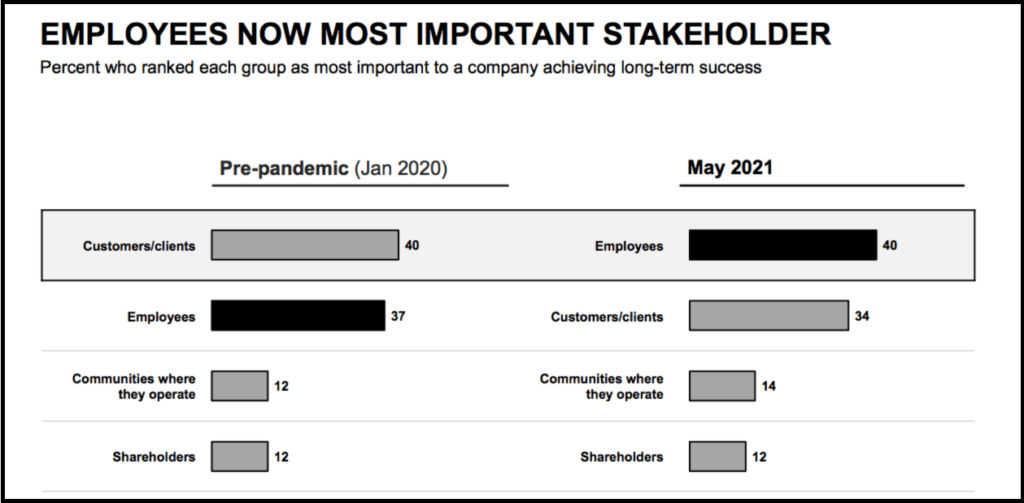Who do people trust most? Employees.
It’s no surprise to us that the data shows that the group people trust most in 2021 is employees.
The 2021 Edelman Trust Barometer and its recent special reports (namely, The Belief-Driven Employee, Trust – The New Brand Equity, and Business and Racial Justice in America) are packed with data about who consumers, candidates and employees trust most today.
The most recent findings have revealed that all audiences have shifted their personal values from the individual to the collective — from “Me” to “We.” And, they’re calling for their employers and the brands they support to do the same in order to earn their trust.
Today, people are looking for brands to focus on making the world a better place. Brands that score the highest level of trust are those who communicate that they:
- Reflect societal values
- Meet a new societal need
- Change social interactions for the better
Employees especially have increased their focus on the beliefs of a company. In 2021, 61 percent of employees choose, leave, avoid or consider an employer based upon their values or beliefs. In fact, the Edelman Trust Barometer has named today’s worker The Belief-Driven Employee.
And, as the more detailed data will go on to show, today’s values-minded employees are the best voices to communicate a company’s stance on important issues, and gain employer brand trust.
Employees trust their employers the most
Employers hold the honored position as the institution that employees trust most. 77 percent of employees trust their employers, but only 62 percent trust business in general, or the media (51 percent). Additionally, employer communications (like official emails) are seen as the most believable media, with 59 percent of employees trusting these messages, outranking government, media reports, and social media.
Employees are the most important stakeholders
This employer trust is essential, as employees are the most critical stakeholders for companies. Prior to the pandemic, customers were king. But now, employees rank as the group most important for companies’ long-term success.

In response to these data points, Edelman CEO Richard Edelman says,
“We need a new employee-employer compact. First, employees need to be recognized as the most important stakeholder. Second, they must have a voice, both in corporate strategy and in the ability to speak publicly over social or other channels…employees are no longer the supporting cast; they are essential partners in the future of business.”
Employees leave or take jobs based upon employers’ values
The 2021 data shows that the main reasons employees change jobs are due to factors of values-alignment with their employers. For employees today, values-focused reasons for leaving rank ahead of lifestyle concerns and desires for better compensation or career advancement.
Additionally, employees expect their employers to take a stand. 36 percent of U.S. employees state that they have left a job solely because their employer remained silent on a societal or political issue.
Conversely, candidates are seven to nine-and-a-half times more likely to work for a company that publicly supports and demonstrates commitment to important issues.
Employee voices are vital for earning trust
As employee story experts and enthusiasts, one area of the 2021 reports that we find especially interesting are the findings surrounding which voices contribute to the greatest levels of brand trust. We were not surprised to learn that a balance of peer and expert voices is ideal.
Employees are both peers and influencer voices
This data supports what we at Stories Inc. see every day: Team members’ voices and the stories from people who experience and form the culture, are valuable, trustworthy sources. Their perspectives inform a brand’s real organizational actions, attitudes, and values.
Example #1: Employees share their company’s mission to impact lives
Philips is a global leader in healthcare innovations and medical technologies that make people’s lives better all over the world. When Philips wanted to share their dedication to advances in healthcare and communicate that they’re a mission-driven company, they knew employee stories would do it best. A total of 12 team members from four countries, across various departments and roles, shared stories of how they have personally experienced Philips mission to better healthcare worldwide.
Example #2: Employees speak to their company’s inclusion and diversity commitment
AstraZeneca sought employee stories from throughout the organization to show the culture’s companywide and integrated commitment to diversity, equity and inclusion (DEI). These stories backup AstraZeneca’s public and company statements that they are champions of inclusion and diversity, and that the company is working to create spaces where employees feel safe and empowered.
Employee stories give proof necessary for gaining brand trust
Consumers, candidates and current employees are looking for proof that your company is working to make the world a better place. The 2021 Trust Barometer shows that your audiences will only trust, patronize and seek employment from your company if they receive that proof from people like themselves.
Content grounded in employee stories provides people with the information that will gain their trust. It’s what is definitely true and trustworthy: you can’t argue with someone’s experience. What your company has done to improve the world, told from the perspective of those who work for the brand, is powerful, memorable, and engaging marketing content.
We can help you capture these stories
Stories Inc. expertly uncovers employees’ stories that bring company values to life. To learn more, contact us or book 15 minutes on our calendar.
Sources:
2021 Edelman Trust Barometer Main Page + Special Reports
Business and Racial Justice: 2021 Edelman Trust Barometer Special Report
Trust, the New Brand Equity: 2021 Edelman Trust Barometer Special Report
The Belief-Driven Employee: 2021 Edelman Trust Barometer Special Report

